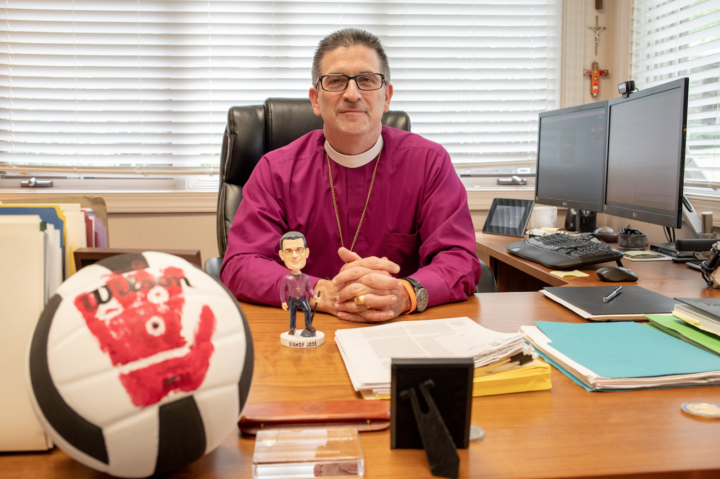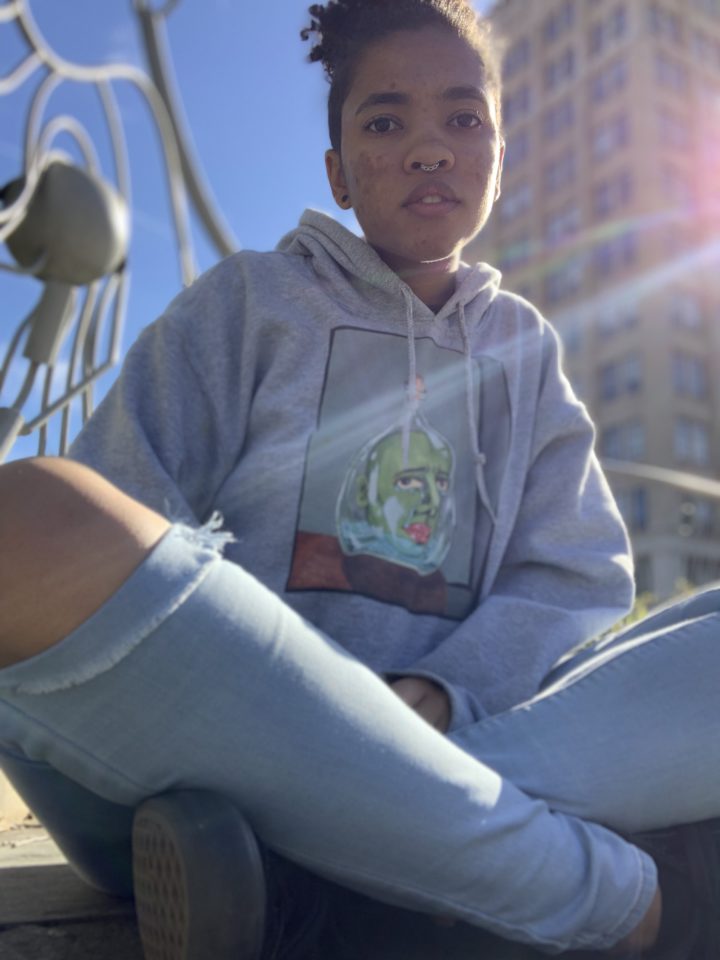Whether you’re grieving a personal loss, the absence of your pre-COVID-19 existence, the killing of George Floyd or some combination of the above, so many of us are in mourning these days.
Fatigue, apathy and volatility are common symptoms of grief, says local clinical social worker Tyra L. Goodman. Often, she notes, clients struggling with loss “feel like their brains are failing. And meanwhile, the rest of the world is just going on as normal.”
But in today’s COVID-19 reality, continues Goodman, life is anything but normal. For those grieving, the pandemic’s disruption has created an odd effect. “There is something that is more congruent about the world experience now for those dealing with loss,” she explains. “They don’t feel quite as isolated in their experience because the world isn’t going on at its regular pace.”
Along with the health crisis, the recent killing of Floyd has impacted the way Goodman’s clients think about mental health. Periods of grief often shrink an individual’s world, Goodman explains. The peripheral gets lost, and the personal gets magnified. Yet for many right now, losing sight of the important calls for racial justice is untenable. The trauma has created a collective grief.
But within these difficult times, moments of pleasure do still emerge. And that’s OK, says Goodman. “Happiness isn’t the absence of things like anxiety or fear or anger or sadness,” she explains. “We’re human. Emotions are fluid.”
With this in mind, Xpress spoke with Asheville residents to learn how they’re finding instances of joy and how their strategies might benefit the broader community during these difficult times.
Designed for connection
“My happiness used to come in a bottle,” says Michael Hayes, executive director of Umoja Health, Wellness and Justice Collective, a local nonprofit. “I drank a 12-pack, and I thought I was good to go.”

For 37 years, Hayes’ life unfolded in this way, resulting in multiple jail sentences. His substance abuse stemmed from childhood trauma, he explains. At 8 years old, Hayes was molested. By 12, he regularly used drugs and alcohol to cope.
But over the past five years, Hayes has been involved in a number of recovery and resiliency education programs. Ultimately, the work led him to create Umoja in 2019. The nonprofit works specifically with people of color to address trauma and healing.
His areas of expertise have come in handy in recent months. A father of six sons and one daughter, Hayes says both COVID-19 and the ongoing impact of systemic racism have put him on edge. There are nights, he reveals, when he lies awake in bed fearful for the safety of his children, especially his oldest son, who is in his 30s. “I know he knows how to act if he gets stopped by the police,” Hayes says. “But what if the cop is having a bad day?”
To mitigate these dreadful hypotheticals, Hayes uses a coping technique called “resourcing,” which uses internal and external resources to achieve a relaxed but alert state. In Hayes’ case, he revisits a positive memory and goes over as many details as he can remember. “It actually calms my body down,” he says. “It doesn’t negate the fact that there are still troubled waters that we’re wading in right now — that there is still systemic oppressions, that there are still people who don’t want to change from the old ways and that COVID-19 is still happening. But it allows my mind to go to that moment so that my body and nervous system calm down.”
Opening yourself up to family and friends, says Hayes, is another essential technique for dealing with individual grief. “A lot of people don’t want to recognize the trauma they’ve gone through,” he explains, especially in Black communities. “We’re told, ‘Don’t talk about it; pray about it.’ Or, ‘What goes on in this house, stays in this house.’ So we learn to suppress things. We teach our Black men to suppress their feelings from the time they’re little boys.”
And for over four decades, Hayes says he heeded the advice, disconnecting from the world around him. But that has since changed. At 52, he says, “my happiness is through connection — it’s my family, my sons and my daughter, my wife, my cohorts at Umoja. My happiness revolves around connecting with people. Humans are intuitively designed for connection.”
Laughter is healing
However, one of the key challenges during COVID-19 is maintaining connections from a distance. For many, virtual meetings have become a lifeline, both personally and professionally. For others, online platforms are also a way for spreading messages of hope.

Throughout April and May, Bishop José A. McLoughlin of the Episcopal Diocese of Western North Carolina filmed a series of short comedy sketches under the title Quarantine with Bishop José. In the opening episode, available on YouTube, the bishop briefly abandons his home laundry duties in order to geek out on his drums. “Do you know how you make holy water?” he asks an imaginary audience, with drumsticks in hand. “You boil the hell out of it,” he answers, before unleashing a rimshot on the kit’s snare and hi-hat.
“Joy and laughter is something that you know God wants us to be about,” McLoughlin says. However, he points out, there is a need for balance. “You can’t ignore the issues of the world. But in the midst of tragedy, laughter is OK. Laughter is healing. And so the whole point I was trying to make with these is that in a world where we’re dealing with so much, it’s OK to laugh.”
Combined, the seven-episode series has garnered over 50,000 views. McLoughlin says he’s received emails from across the country and world. “People write me, saying, ‘Thank you for exhibiting a religious leader who talks about and exhibits joy and isn’t on TV telling me I’m not good enough and I’m not worthy and I’m going to hell because I’m gay.”
Among his admirers is the church’s presiding bishop Michael Curry. “He said to me, ‘José, thank you for being a fool for Christ,’” McLoughlin recalls with a laugh.
The series aired its finale on May 24, the day before Floyd’s death. Today, McLoughlin views the episodes as a bridge to deeper conversation about issues like systemic racism. “Through these videos, people saw a different side of me; they saw I was letting my guard down,” he explains. “When you allow yourself to be vulnerable, it builds trust, and I think it makes it possible to have the tough conversations we’re having now and that we will continue to have about what it means to be a beloved community.”
All the small things

McLoughlin’s sketch comedy also highlights the importance of creative projects during periods of grief. This has certainly been the case for 18-year-old photographer and activist Ajax Ravenel. “I took pictures at recent protests I’ve been to,” she says. “And that’s been a really good outlet to channel the negative energy in a way that is positive.”
Looking to spread this positivity, Ravenel has since helped organize the art exhibit Resilience: It Is Our Duty to Fight, Protest, Create and Heal. Currently on display at the YMI Cultural Center, the collection features works by several local artists of color, including Joy Maat, Jenny Pickens, James Love, Tarah Singh, Liz Williams, Jessica Delia and Ravenel.
Along with her creative endeavors, Ravenel says she leans heavily on personal relationships with community elders, as well as mentors including Michael Hayes. “I’m in contact with them on a daily basis,” she says. “I do check-ins with them. I’m like, ‘Hey, I’m feeling this way, how do I express this? And how do I move through this feeling?’”
Practicing mindfulness is another technique she employs not only for her mental health, but also for her physical well-being. Both of which, she says, must be properly managed if she is to continue her work advocating for racial justice. “The more we take care of ourselves and each other, the more momentum we will have and the more we’ll be able to continue moving forward,” she says.
Mindfulness, continues Ravenel, is also key for finding moments of joy amid today’s uncertainties and tragedies. “It’s in the small things,” she explains. “It’s in the beauty that you see. It’s taking a walk on a sunny day. It’s in the deep breaths.”




Before you comment
The comments section is here to provide a platform for civil dialogue on the issues we face together as a local community. Xpress is committed to offering this platform for all voices, but when the tone of the discussion gets nasty or strays off topic, we believe many people choose not to participate. Xpress editors are determined to moderate comments to ensure a constructive interchange is maintained. All comments judged not to be in keeping with the spirit of civil discourse will be removed and repeat violators will be banned. See here for our terms of service. Thank you for being part of this effort to promote respectful discussion.